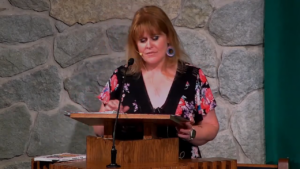TGC Author Advocates for Using Trans Personal Pronouns, Suggests Not Using them Makes one a ‘Weaker Brother’

In a recent Gospel Coalition podcast, author and contributor Rachel Gilson answers the question of whether Christians should use people’s personal pronouns, noting that this issue “is probably one of the most difficult to answer well in a space like this, and I mean like in a digital question and answer type space.”
We do not know what is difficult about it: the answer is simple.
No. No, we should not use them.
This is true of the more benign ones like he/she/them/etc., but also the grotesque world of “nounself-pronouns” and “neo-pronouns” where people identify as “xe/xem/xyr, moon/moonself, star/starself, bee/beeself, bun/bunself, and anything else under the sun.
However, the question is a bit more complicated for Gilson, who has been smuggling unbiblical perspectives on biblical sexuality into the church for years. She previously advocated (or at the very least, gave a tacit approval) that if one partner in a “gay marriage” becomes saved, then they should not necessarily divorce their same-sex “spouse,” because “God hates divorce,” but rather continue in the marriage and remain celibate.
She’s also expressed her belief that becoming saved and having a new heart has essentially zero effect on one’s sexual orientation, and that for all intents and purposes, sexual orientation is not something that is touched by the sanctifying process of the Holy Spirit. She believes that the number of gay people who get their sexuality redeemed by Christ and oriented towards the opposite sex is a fraction of a fraction of a percent, but that this reality is “ok” because her homosexuality is a “gift” to the church.
In her podcast answer, Gilson goes straight to the scriptures which talks about the weaker versus stronger brother, and says that if people do not wish to use these [ridiculous and made up] pronouns, that is their choice, but that “you have to recognize that when you are interacting with a transgender person your inability to use their preferred name or pronoun could actually be received as very offensive by them or deeply hurtful by them.”
In contrast, she explains the “stronger brother” position, which according to her warped theology is that “others of us have no problem at all using preferred names and pronouns. We’re like, “Yes! This is a way of showing love. I’m ready to do this.” And in that case, your conversation partner is probably easily going to feel loved and accepted by you.”
Once this compromise is made, calling a boy a girl or a girl a boy, or a boy “bunself” or a girl “fairyself,” Gilson explains that this grants you “access to the heart of your friend,” which then in turn lets you talk about spiritual things with them by getting those pronouns and lies “in.”
Sadly, Gilson has it completely backwards. It is not the weaker brother who refuses to call people by their preferred pronouns, but rather the stronger one who is not willing to compromise the truth of God’s reality and break the 9th commandment despite enormous pressure from the world and once formerly reputable Christian organizations like the Gospel Coalition telling them to do so.
[Editor’s note: If you aren’t familiar with Paul’s thoughts on this, you can look the up in Romans 14. In context, weaker brothers are the ones that make up rules that they try to make “religious” and impose on everybody else. Kind of like Rachel Gilson is doing.]
Transcript below, provided by WPC
I think the question of preferred pronouns…really can come down to a question of conscience. So if you’ve done a quiet time recently in the weak brother/strong brother passages of scripture, Paul has a category for the reality that some Christians are going to come to issues and fall in different spots. And one of the most important questions there is how are we going to relate to each other when we fall in different spots? So, on the one hand, some of us would feel incredibly compromised using a transgender person’s preferred name or pronouns, because it feels like we’re complicit in a lie. It feels like we’re breaking the ninth commandment, right?Like we’re bearing false witness about a neighbor, and we need to take that really, really seriously. It is never safe to go to a place that your faith doesn’t allow you to go against your conscience. And if that is your position, you have to recognize that when you are interacting with a transgender person, your inability to use their preferred name or pronoun could actually be received as very offensive by them or deeply hurtful by them.
And so I would encourage people in that category to think, “Okay, well, my truth is clear. How can I communicate clearly the grace of Christ here? How can I go above and beyond to show love, knowing that my posture on pronouns is going to be tricky for the person I’m talking with?” Others of us have no problem at all using preferred names and pronouns. We’re like, “Yes! This is a way of showing love! I’m ready to do this.” And in that case, your conversation partner is probably easily going to feel loved and accepted by you.
So then I would challenge you, since you have access to the heart of your friend, what would it mean for you to use that access to have truthful conversations either about who Christ is, maybe, if you feel competent about the nature of the body, even just beginning conversations of if your friend has thought about how God relates to these questions in their lives. But no matter where we come down, I want us to be able to relate to each other with honor and respect, because the church has not had to answer these questions before, and we we need to have grace with each other, right? We know that God loves desperately the transgender people in our lives, and so we need to be thinking as a community: how can we expose them to the love that we have received ourselves?








“And such were some of you. But you were washed, you were sanctified, you were justified in the name of the Lord Jesus Christ and by the Spirit of our God” (1 Cor. 6:11). I wonder if her Bible is missing this verse?
When was the Gospel Coalition ever reputable? I think this subversion was always the purpose. I mean, I could be wrong.
Idiocy taken to stratospheric heights by someone who would better serve humanity at the end of a mop.
This isn’t just stupidity, this is very deliberate rebellion against God.
Many of us support the Gospel Coalition 🏳️🌈🏳️⚧️🇺🇸🇮🇱
Too bad you domestic terrorists want to cancel the Gospel Coalition
Many support communism – that doesn’t make it less repugnant and godless.
Dear Johnny
Bearing false witness against your neighbor is a sin.
You can always tell a tree by its fruit. Upvote to Floyd.
Jesus must be weak since I don’t see any of this woke foolishness going on in his word.
The co-founders of TGC are Tim Keller and Don Carson.
Keller is an obvious enemy of the cross. In The Reason For God, Quoting Carl Bath, he falsely accuses ‘The Church’ of having crucified Christ. How twisted is that? The Church didn’t exist until after the crucifixion. And does he think that the lawless men who crucified Christ have any part with the Church? Never mind all of Keller’s Marxist nonsense and the fact that he hardly ever quotes scripture or godly authors. This accusation alone disqualifies him.
I have sat under the preaching of Don Carson in Singapore. My main impression is that he is a cold fish. The man has no fire in his belly. Sure, he can exegete scripture, but like a lot of pure academics, it comes across as hollow and nuanced. I have nothing specific against him, other than that he joined forces with Keller to form such an unnecessary enterprise in the first place. Even if its original purpose was noble, it certainly is not now. This is a vessel filled to the brim with impurity and foolishness.
The Church does not need TGC. It needs faithful pastors who preach the unadulterated, un-nuanced Word of God week in and week out to local congregations, and care for their flocks as Christ does.